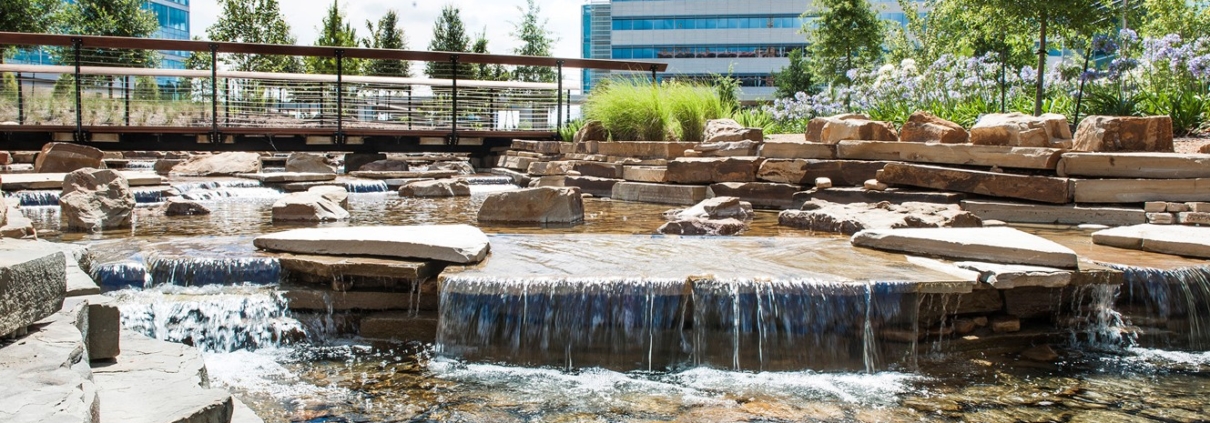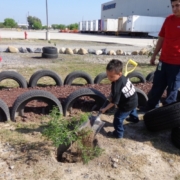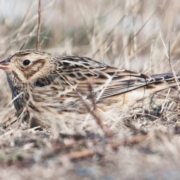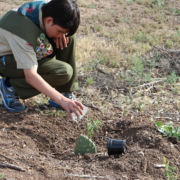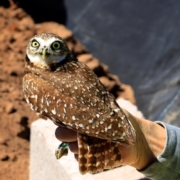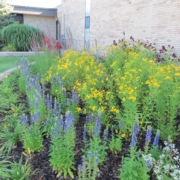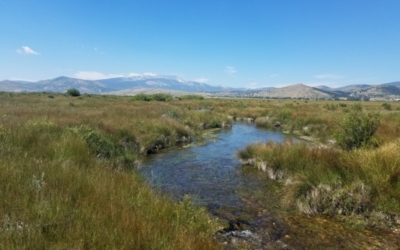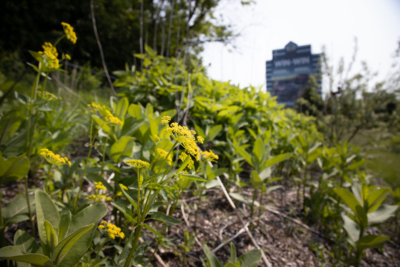Shell | Protecting Migratory Species in the Energy Corridor
Off Interstate 10 in the Energy Corridor of Houston, Texas, lies a haven for pollinators and other wildlife along the migratory flyway. The Shell Oil Company’s Woodcreek Campus sits on 100 acres of land, with just under half of that boasting natural areas including wildflower gardens, a creek and a forested area.
With the rapid development (and paving over) of natural habitat in the Energy Corridor of West Houston, we feel that our campus plays an important role in the migratory success [of pollinators] –Laura Castle, External Relations Advisor – Environmental
The Woodcreek Campus has always been focused on keeping as much green space as possible, with design considerations for wildlife being an important factor since the property was acquired in 1978. When Shell Real Estate began to refurbish existing buildings and construct new ones, it made certain the construction was in line with conserving and restoring wildlife habitat on-site, and aimed to increase the accessibility of nature to its 6,000 employees.
The site’s employees tend to several conservation projects at Woodcreek Campus, which first achieved WHC Certification in 2010. They built a native pollinator garden that includes monarch-friendly plants such as milkweed, Gulf mulhy, Texas lantana and yellow bells. Steps were taken to protect hummingbirds with the installation of window screens during migratory season to reduce window collisions, along with moving flowering vegetation to open areas so the birds are not drawn near the buildings. Shell employees have also taken up actions to reduce human-snake interaction while remaining a no-kill facility, including relocating snakes found on site to the nearby Addicks Reservoir where suitable habitat exists, and human-snake interaction is less likely. Wildlife sightings and health of the habitats are monitored daily to make sure maintenance is not needed and the projects are meeting campus environmental goals.
Gina Flynn, Real Estate Services Manager at Woodcreek, says that employees are incredibly proud of the collection of projects on their site. With three different community engagement events a year, they certainly get that chance to educate and share their success. Woodcreek hosts Powering Conservation Day each year where employees and their children interact with Shell’s environmental partners and learn about the campus’s conservation initiatives. Environmental Awareness Day celebrates Earth Day each year and engages over 1,000 people in learning about the value of conservation in their business and encourages employees to become more involved in the efforts. Flynn states, “We are proud that we get to tell our story in community engagement events. The positive response we get from our employees and environmental NGO partner attendees is energizing!”
In addition to engaging employees and families, the team at Woodcreek works closely with local schools. Over 30 second graders from a local elementary school are educated each year, meeting an important community need for science education. The students learn about the importance of butterflies as pollinators, Houston’s critical location in the Tri-Regional Monarch Flyway, and how Shell is working with national and local conservation groups to use milkweed and other native Texas plantings to increase the numbers of monarch butterflies passing through to and from Mexico.
The global pandemic has not stopped Woodcreek from achieving their conservation goals. Although education and engagement events are not possible, Flynn states they continue to make capital improvements in their landscaping with conservation in mind. The team is also dedicated to continuing education about native landscaping and the importance of these habitats virtually, including encouraging employees to incorporate native landscaping in their personal gardens with the use of the WHC collaborative document: A Guide to Native Landscaping in the US.
Related Content
- White Papers:
- Relevant President’s Blog or Wildlife Blog posts
- A Hands-On Approach to Building the STEM Workforce of Tomorrow
- Let’s Go Outside! The Benefits of Learning in the Outdoors
- Hands-On Means Minds-On
- The Importance of Pollinators
- New Ways to Think About Landscaping the Corporate Campus – A Conservation Conference Session Recap
- Back to School: Partnering with Local Schools to Strengthen Your Certification Program
- What’s All the Fuss About Native Plants?
- Celebrate Earth Day!
- Project Guidances:
- Webinars:
- Beyond the Pollinator Garden: How to Make the Greatest Impacts for Bees and Butterflies
- How to Select the Best Lessons for Your Education Projects
- Native Bees: Bringing Essential Species Back to Your Habitat
- You Too Can Create Positive Pollinator Projects
- The Three “E”s to Success: Employees, Education and Engagement
- Measuring the Success of Your Conservation Education Projects
- Event Planning 101: How to Host a Successful Community Event at Your Habitat
- Taking Action Through Pollinator Projects
- STEM Learning in Your Habitat
- Plants and Pollinators with Dr. Stephen Buchmann
- STEM to STEAM Education: Using Art as a Gateway to Learning
- Monitoring for Reptiles and Amphibians
Quick Facts
| Site Name: | Woodcreek Campus |
|---|---|
| Category: | Member Spotlight |
| Tags: | avian, Awareness and Community Engagement, landscaping, pollinators, Reptiles and Amphibians |
| Site Location: | Houston, Texas |
| Partners: | Houston Wilderness, National Fish and Wildlife Foundation |
| Certification Since: | 2010 |
| Certification Level: | Gold Certified |
| WHC Index Link: | Learn more about the program |
